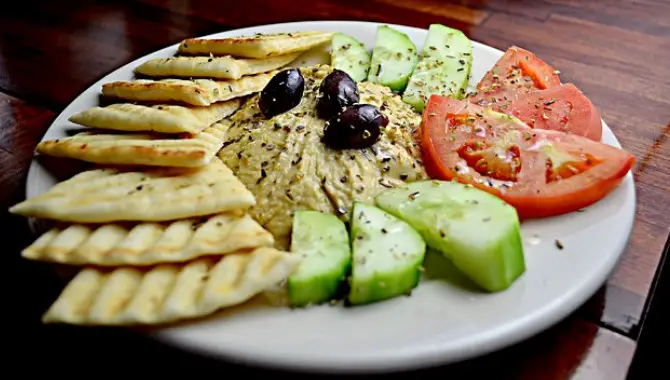Contrary to the beliefs of many, vegan diets can be exciting and extremely varied, with all kinds of fruit, vegetables, nuts, rice, oats and bread all very much on the menu. Yet, there is little doubt that a good dip can make a big difference when eating foods like celery or carrots, and a good spread can go on top of crackers, or act as a filler for bagels, greatly improving the taste. Therefore, hummus is potentially ideal, as it functions as either a dip or a spread, but many vegans are unsure about whether or not it contains hidden animal products.
So is hummus vegan? The simple answer is ‘yes’. In most cases, hummus is perfectly suited to a vegan diet, regardless of whether it is store bought or homemade. The core ingredients are chickpeas, either tahini or sesame seeds, lemon, garlic and olive oil, all of which are perfectly vegan-friendly.
At this point, you may be wondering why I said “in most cases” and I will go into this in more detail later on. Put simply, some pre-made hummus products found in shops do contain problematic ingredients and this becomes more common when you are buying flavoured varieties. In this article, I will explain what hummus is, how it is made and why it is usually suitable for vegans. I will also cover the main exceptions, what ingredients you should look out for, and how you can take sensible steps to avoid any hummus variations that are unsuitable for vegans.
Can Vegans Eat Hummus?
Hummus is a dip or spread, which is prepared by blending crushed garbanzo beans (chickpeas) with tahini. In its most basic form, it is typically flavoured using a combination of lemon, garlic and olive oil, while salt is also a popular addition. The chickpeas are sometimes replaced by another bean, while many types of hummus are enhanced through the addition of ingredients like red peppers, onion, paprika, chives, orange peel, pepper and tomatoes. For this reason, generally speaking, hummus is largely made from plant-based ingredients and is completely vegan-friendly.
Of course, when you are buying hummus from a store, it is fairly common to see a number of additives. These tend to be included to improve the texture or appearance of the hummus, or to improve its shelf-life. The good news is, the vast majority of these are vegan too, although one or two ingredients do tend to cause a little bit of concern.
Citric acid causes alarm for some vegans, as it is found in a number of dairy products. In reality, it is naturally found in citrus fruits and is mass produced using a technique based around feeding a type of fungus on common or simple sugars, such as sucrose or glucose. Similarly, guar gum is sometimes used to give hummus an added thickness and is also found in products like milk and yogurt, raising suspicion. Yet, guar gum is safe, as it is extracted from guar beans.
Nevertheless, as with almost any pre-prepared food type, there are a few exceptions. The most common exception with commercial hummus is the use of honey, which is sometimes added for flavour, and which would make a hummus product off-limits to vegans. In most cases, honey flavoured hummus will be clearly marketed as such, so this is unlikely to be a major problem, but I would recommend checking the ingredients anyway, as it is better safe than sorry.
Things become slightly more complicated when buying hummus dishes in a restaurant, or when you are travelling to different parts of the world. This is because there are a number of regional variations, which do make use of animal products. For example, a dish that is popular in Jordan and Palestine is laban ma’ hummus – yogurt and hummus.
Meanwhile, some other regions make alterations to the core recipe. Examples that I have stumbled across include the addition of milk, or the use of butter instead of olive oil. It is possible that certain store bought hummus products will also make similar alterations, so check the ingredients for potential use of milk, yogurt, cheese and eggs.
As a basic rule, the fewer ingredients that are included within a hummus product, the more like it is to be vegan-friendly. You are significantly more likely to encounter problems when you start buying hummus with unique flavours, as the addition of optional ingredients may alter the texture, requiring more ingredients to be added in order to correct this. With that being said, it is worth remembering that most flavoured hummus will be vegan too.
How Can I Avoid Non-Vegan Hummus?
If you are buying pre-made hummus from a shop, the main way to avoid non-vegan varieties is to check the ingredients list carefully for any mention of animal products, or ingredients which may be produced with the use of animal products. As I covered in the last section, the main offenders here are likely to be honey, milk, cheese and yogurt. Even if you do not see an obvious dairy ingredient, you should check the allergy information for any reference to dairy. Where possible, try to stick to products that are certified vegan by a credible organisation, or clearly labelled as vegan-friendly.
For those who are new to the vegan lifestyle, checking ingredients can be a little daunting. If you are left in any doubt about whether or not a specific product is suitable, you might opt to reach out to the brand. Most companies will be more than happy to confirm whether or not their product is suitable for vegans and this can give you added peace of mind. Customer support phone numbers and online contact forms are great for this, as is social media.
If you are looking to order hummus in a restaurant, check the menu for any allergy information or references to whether or not it is vegan-friendly. If this information is not provided, it is best to ask. Some restaurants may even be able to make it vegan-friendly, even if the standard menu item is not vegan. In my experience, it is a good idea to let your server know that you are a vegan anyway, as they will be able to relay this information to the kitchen and the kitchen staff will be able to make sure there is no accidental cross-contamination with animal products.
Ultimately, if you are unable to verify its suitability for vegans, it is best to avoid and try to find an alternative. Of course, there is also the option to make your own hummus at home, as I will cover in the next section.
How to Make Hummus At Home
While the vast majority of hummus products on the shelves will be perfectly suited to a vegan diet, some vegans do prefer to make their food at home, whether it is for the extra peace of mind, or just the satisfaction of making it yourself. The good news is, hummus is actually extremely easy to make, as long as you own a food processor. For a basic hummus dip or spread, you will require the following ingredients:
1 x can of chickpeas (400g)
2 x garlic cloves (peeled and crushed)
Tahini (3 tablespoons)
Olive oil or extra virgin olive oil (around 80ml)
Lemon juice (2 or 3 tablespoons)
To start, you will need to drain and rinse the chickpeas, using cold water. Once you have done this, add them to the food processor, along with the olive oil. Start processing, until the chickpeas and oil are almost smooth. At this point, stop the processor and add the lemon juice, the garlic cloves and the tahini, along with a couple of tablespoons of water and a pinch of salt. Turn the processor back on and allow it to blend the ingredients until a smooth paste is formed. This will typically take around five minutes, but it may depend on the quality of your processor.
If you feel the hummus looks too thick, add a small amount of extra water and blend again. You can also add a number of optional ingredients, in order to enhance the flavour. Common examples include a small amount of chopped up onion, or some chopped red peppers. The great thing is, due to the ease of the process, experimentation is simple too.
Once the hummus is smooth and at a consistency you are happy with, it is ready to use as a dip or a spread.
Possible Grey Areas With Hummus
Finally, there are some potential grey areas for vegans to be aware of when it comes to both store bought hummus and even hummus prepared at home. While veganism is typically defined as the practice of avoiding animal products, this is not a universal definition. Some strict vegans take things a step further and avoid products that involve animal harm at any stage. With this in mind, there are some products which may be off-limits, depending on what influenced your decision on why to become vegan in the first place and the principles you have adopted.
A good example of this is the addition of sugar to some hummus products. Sugar is sometimes filtered using bone char – a process which is especially common with white sugar, as it helps to strip the colour. This bone char is most often sourced from cattle and although a growing number of companies avoid using bone char filtered sugar, there is not always a clear way to tell whether the bones of animals have been used along the way. In fact, most likely, you would need to contact the manufacturer directly and enquire about where the sugar was sourced from.
Similar dilemmas exist with the use of palm oil and coconuts. With the former, while the oil itself is perfectly vegan-friendly, the industry is rife with bad practices and many companies involved do cause harm to wildlife. With the latter, there are a small number of countries where the use of monkeys for coconut picking is a growing problem and while this is relatively rare in the grand scheme of things, there is still the potential of contributing to animal exploitation. For this reason, hummus products could be more accurately regarded as “vegan by most standards”.
Welcome to VeganClue - My name is Robert Van De Ville and together with my team we spent hundreds of hours researching the most relevant topics for Vegans and non yet Vegans. Are you looking for more information about Veganism, animal welfare, diet, health, and environmental benefits of the Vegan lifestyle? You are in the right place! Enjoy the site.


